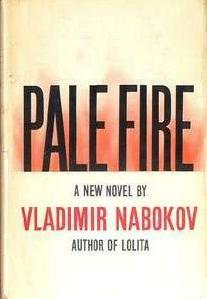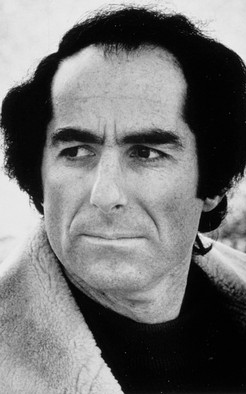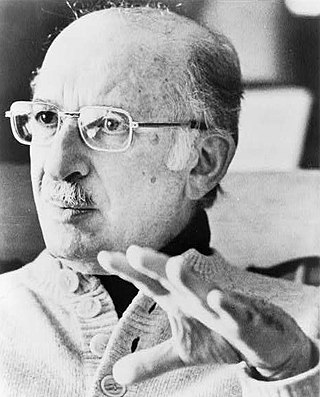
John Hoyer Updike was an American novelist, poet, short-story writer, art critic, and literary critic. One of only four writers to win the Pulitzer Prize for Fiction more than once, Updike published more than twenty novels, more than a dozen short-story collections, as well as poetry, art and literary criticism and children's books during his career.

Pale Fire is a 1962 novel by Vladimir Nabokov. The novel is presented as a 999-line poem titled "Pale Fire", written by the fictional poet John Shade, with a foreword, lengthy commentary and index written by Shade's neighbor and academic colleague, Charles Kinbote. Together these elements form a narrative in which both fictional authors are central characters. Nabokov wrote Pale Fire in 1960–61, after the success of Lolita had made him financially independent, allowing him to retire from teaching and return to Europe. It was commenced in Nice and completed in Montreux, Switzerland.

Saul Bellow was a Canadian–American writer. For his literary work, Bellow was awarded the Pulitzer Prize, the 1976 Nobel Prize in Literature, and the National Medal of Arts. He is the only writer to win the National Book Award for Fiction three times, and he received the National Book Foundation's lifetime Medal for Distinguished Contribution to American Letters in 1990.

Philip Milton Roth was an American novelist and short-story writer. Roth's fiction—often set in his birthplace of Newark, New Jersey—is known for its intensely autobiographical character, for philosophically and formally blurring the distinction between reality and fiction, for its "sensual, ingenious style" and for its provocative explorations of American identity. He first gained attention with the 1959 short story collection Goodbye, Columbus, which won the U.S. National Book Award for Fiction. Ten years later, he published the bestseller Portnoy's Complaint. Nathan Zuckerman, Roth's literary alter ego, narrates several of his books. A fictionalized Philip Roth narrates some of his others, such as the alternate history The Plot Against America.

Edgar Lawrence Doctorow was an American novelist, editor, and professor, best known for his works of historical fiction.

Bernard Malamud was an American novelist and short story writer. Along with Saul Bellow, Joseph Heller, Norman Mailer and Philip Roth, he was one of the best known American Jewish authors of the 20th century. His baseball novel, The Natural, was adapted into a 1984 film starring Robert Redford. His 1966 novel The Fixer, about antisemitism in the Russian Empire, won both the National Book Award and the Pulitzer Prize.

Edmund Wilson Jr. was an American writer, literary critic and journalist. He is widely regarded as one of the most important literary critics of the 20th century. Wilson began his career as a journalist, writing for publications such as Vanity Fair and The New Yorker. He helped to edit The New Republic, served as chief book critic for The New Yorker, and was a frequent contributor to The New York Review of Books. Wilson was the author of more than twenty books, including Axel's Castle, Patriotic Gore, and a work of fiction, Memoirs of Hecate County. He was a friend of many notable figures of the time, including F. Scott Fitzgerald, Ernest Hemingway, and John Dos Passos. His scheme for a Library of America series of national classic works came to fruition through the efforts of Jason Epstein after Wilson's death. He was a two-time winner of the National Book Award and received the Presidential Medal of Freedom in 1964.

John Simmons Barth was an American writer best known for his postmodern and metafictional fiction. His most highly regarded and influential works were published in the 1960s, and include The Sot-Weed Factor, a whimsical retelling of Maryland's colonial history; Giles Goat-Boy, a satirical fantasy in which a university is a microcosm of the Cold War world; and Lost in the Funhouse, a self-referential and experimental collection of short stories. He was co-recipient of the National Book Award in 1973 for his episodic novel Chimera.

Kenzaburō Ōe was a Japanese writer and a major figure in contemporary Japanese literature. His novels, short stories and essays, strongly influenced by French and American literature and literary theory, deal with political, social and philosophical issues, including nuclear weapons, nuclear power, social non-conformism, and existentialism. Ōe was awarded the 1994 Nobel Prize in Literature for creating "an imagined world, where life and myth condense to form a disconcerting picture of the human predicament today".
Cynthia Ozick is an American short story writer, novelist, and essayist.

Humboldt's Gift is a 1975 novel by Canadian-American author Saul Bellow. It won the 1976 Pulitzer Prize for Fiction and contributed to Bellow's winning the Nobel Prize in Literature the same year.

Lolita is a 1955 novel written by Russian-American novelist Vladimir Nabokov that addresses the controversial subject of hebephilia. The protagonist is a French literature professor who moves to New England and writes under the pseudonym Humbert Humbert. He describes his obsession with a 12-year-old "nymphet", Dolores Haze, whom he kidnaps and sexually abuses after becoming her stepfather. Privately, he calls her "Lolita", the Spanish nickname for Dolores. The novel was originally written in English, but fear of censorship in the U.S. and Britain led to it being first published in Paris, France, in 1955 by Olympia Press.
Irving Malin was an American literary critic. Malin attended Thomas Jefferson High School and Jamaica High School and graduated magna cum laude from Queens College in 1955 and received his PhD from Stanford University in 1958. He married Ruth Lief in 1955 and they remained married until his death. He taught at the City College of New York from 1960 until his retirement in 1996. Malin did his dissertation on the fiction of William Faulkner and made his initial academic mark as a critic of American Jewish Literature, editing an early collection on the fiction of Saul Bellow as well as a critical book and a general anthology on Jewish literature in the US. He subsequently became interested in writers who practiced innovative techniques such as James Purdy and John Hawkes as well as writers who broke down the boundaries between fiction and nonfiction such as William Styron and Truman Capote. One of the pioneering academics to take an interest in metafiction and experimental writing, Malin was an early contributor to the Review of Contemporary Fiction, writing over five hundred book reviews for this and other publications. In the latter portion of his career, Malin edited several anthologies of essays on Henry James, Thomas Pynchon, William Goyen, George Garrett, Don DeLillo, Vladimir Nabokov, Leslie Fiedler, and William Gass. He was a fellow at Yaddo and the Huntington Library and served on many boards and award panels. Malin died December 3, 2014.
Steven G. Kellman is an American critic and academic, best known for his books Redemption:The Life of Henry Roth (2005) and The Translingual Imagination (2000).

Chicago literature is writing, primarily by writers born or living in Chicago, that reflects the culture of the city.
A novelist is an author or writer of novels, though often novelists also write in other genres of both fiction and non-fiction. Some novelists are professional novelists, thus make a living writing novels and other fiction, while others aspire to support themselves in this way or write as an avocation. Most novelists struggle to have their debut novel published, but once published they often continue to be published, although very few become literary celebrities, thus gaining prestige or a considerable income from their work.

The Tenants is the sixth novel of Bernard Malamud, published in 1971.

The Death of Literature is a 1990 book by American literary critic and professor Alvin Kernan. In the book, Kernan considers the circumstances and causes of what be describes as the death of the "old literature" of romanticism and modernism. Among the causes he considers are recent theoretical approaches such as deconstruction, the politicization of criticism, and the rise of television culture.

Before Novels: The Cultural Contexts of Eighteenth Century English Fiction is a 1990 book by literary scholar and professor J. Paul Hunter. Hunter gives an account of the many non-fictional sources that led to the rise of the English novel, many of them non-literary.

Julian Lane Moynahan was an American academic, librarian, literary critic, poet, and novelist. Much of Moynahan's academic work was focussed on D. H. Lawrence and Vladimir Nabokov. He was active as a book reviewer for leading publications on both sides of the Atlantic and was awarded a Guggenheim Fellowship in 1983.
















